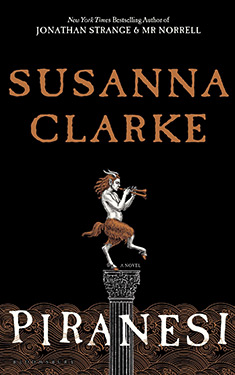Susanna Clarke
Completed 5/16/2021, Reviewed 5/17/2021
5 stars
I think this book is another love it or hate it book by Clarke. I loved it, just as I loved Jonathan Strange and Mr. Norrell. I was shocked when I found out that some people hated Strange, but this time, I have prepared myself for that inevitability. This book is a beautifully written tale of a man trapped in a parallel world suffering from Stockholm syndrome. He has come to love his plight, creating his own mythology and rituals at the hands of a captor who is searching for the Great and Secret Knowledge of the ancients. This book is slim compared to the massive tome of “Strange” and not a footnote in sight, but it is just as equally effective. I was transported to the strange world of Piranesi and enrapt by a story reminiscent of Emma Donoghue’s “Room”. This book has been nominated for the Hugo and Nebula among others. If I were voting, it would be a serious contender for either.
The story begins with Piranesi describing life in the “House”, a massive series of halls and vestibules lined with statues and beset by an ocean whose tides climb the staircases and fill the lower levels. The ocean also provides Piranesi with seafood and seaweed. Rain provides him with fresh water. He takes care of thirteen skeletons which lie about the house, giving the dead offerings of prayers and food. After a while, we find out this is an Other, a person who meets Piranesi twice a week, providing him with additional food and supplies. The nature of Other is at first obscure, but clearly seems to have some dominance over Piranesi. He says they are working on learning the Great and Secret Knowledge and Piranesi is key to helping discover this by reporting back everything he knows about the House. This is all Piranesi knows until one day a third, then a fourth person appears, rocking his understanding of his world, not unlike Plato’s Cave.
The book is very effectively told in first person in the form of Piranesi’s journal entries. The beginning is a little difficult to understand, as the narration describes this strange house but then comes together when you realize that it is Piranesi’s whole world. When we meet the Other, we immediately get the sense he has kept Piranesi there for a long while and he has come to accept and even love his plight and his captor. The House is Piranesi’s reality, even his god. Anything that contradicts this is just absurd.
Piranesi is an easy character to love and empathize with. He is an innocent, naïve and eager to please the Other. Right from the get go, you guess that something is not right with the Other, who appears in handsome suits while our narrator lives in old clothes. But Piranesi is so brainwashed into thinking that the House is the world and he and Other are the only two humans who inhabit it, anything else is absurd. Piranesi loves and worships the House and knows every inch of its hundreds of halls and vestibules.
The process of Piranesi’s coming to understand that there is another world outside of the House is very exciting. Other warns him that if he has contact with the new person, who Piranesi dubs “16”, it will drive him insane. This process of understanding comes in the form of Piranesi discovering that his journals actually contain information about the outside world. He doesn’t understand these older journal entries, but slowly comes to understand that something is amiss, particularly with Other. Reading through the journal with Piranesi is like the unraveling of a thrilling mystery which we quickly get but he does not.
I give this book five stars out of five. I found it riveting. I tore through the last one hundred and fifty pages in a matter of hours, keeping myself awake long enough to finish it, and waking up a few hours later to pound out this review. I was caught up in Piranesi’s realization that a world exists outside the house. I loved the intense and inevitable end and was devastated by it. Clarke has written another astounding novel that bears little resemblance to its predecessor. It’s short, only two hundred and fifty pages, but effective and riveting. I’m sure there will be some detractors, but I loved it and think it’s worthy of all the nominations it’s racking up.

No comments:
Post a Comment